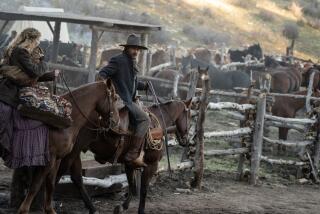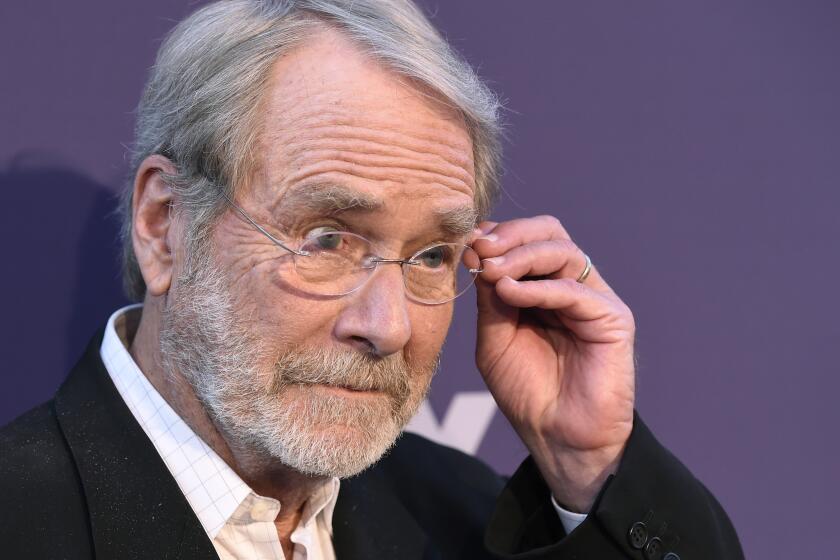Film Director Elia Kazan to Receive Oscar, Forgiveness
Forgiveness came this week for legendary director Elia Kazan--and as befits a Hollywood story, it came with an emotional appeal by an actor.
For years, film festivals, critics associations and the American Film Institute refused to honor the 89-year-old director, one of the most celebrated figures in 20th century theater and film, because he informed on his friends during the onset of the notorious Hollywood blacklist in the 1950s.
So it came as a great surprise when Karl Malden gave an impassioned speech at a Jan. 7 board meeting of the Academy of Motion Picture Arts and Sciences, proposing an honorary Oscar for Kazan.
After several members seconded the nomination, the 39-member board voted overwhelmingly to give the director an honorary Oscar. The award, given in recent years to Akira Kurosawa and Stanley Donen, will be presented at the March 21 Oscar ceremony.
The decision to honor Kazan, announced earlier this week, marked a dramatic turnaround in the artistic fortunes of Kazan, who made a star out of Marlon Brando, discovered James Dean, directed the trailblazing plays of Tennessee Williams and Arthur Miller and won two directing Oscars, for “Gentleman’s Agreement” and “On the Waterfront.”
But for many years, Kazan’s achievements have been overshadowed by politics. In 1952, the director testified before the House Un-American Activities Committee, informing on eight old friends from the Group Theatre, including playwright Clifford Odets and actress Paula Strasberg, who, with Kazan, had once been members of the Communist Party.
Kazan’s actions provoked a whirlwind of protest that still reverberates. His detractors derailed an attempt two years ago by the Los Angeles Film Critics Assn. to honor him. In 1989, Kazan was denied the AFI’s prestigious Life Achievement Award after an acrimonious board meeting.
Family members say that Kazan, who lives in New York, plans to travel to Los Angeles and accept the Academy Award in person. “When I spoke to Elia, I told him he better be here,” said Malden, who met Kazan in 1937 when they worked in the Group Theatre. “He said he’s going to get himself a new tuxedo. He was very grateful and pleased.”
On Thusday, Kazan issued a statement saying, “I thank the academy for its recognition. This is my opportunity, above all, to thank the men and women who stood with me behind the camera and at its side. I couldn’t have begun to do anything without their help, and they know who I’m talking about, so let’s say it’s their achievement as well as mine.”
Whether the change of heart came from the cooling of political passions or the passage of time is hard to say. Academy President Robert Rehme said Thursday that reaction has been supportive but subdued. “We got one anonymous phone call and one thoughtful letter criticizing the decision, but otherwise the reaction, which has come from several significant names in the industry, has all been positive.”
But the belated recognition for Kazan has revived discussion of several larger issues. Many believe that the film industry has been reluctant to honor Kazan not only because he betrayed his friends, but because the industry has a guilty conscience about responding to anti-communist hysteria with a blacklist that put many people out of work for years.
These issues were heatedly debated at the AFI’s 1989 board meeting. At that time, a proposal to honor Kazan, supported by Charlton Heston, was rejected after several members, including producer Gale Anne Hurd, criticized the nomination. Kazan, AFI insiders say, has not been nominated since, a snub that Heston has called “an embarrassment to the AFI and to Hollywood.”
AFI chairman Tom Pollock responded to the announcement of Kazan’s honorary Oscar by saying: “Because the [AFI] board selects just one recipient each year, regrettably there are a number of film greats who have not received the honor, though each of them is certainly deserving. So we salute the academy for recognizing Kazan’s singular achievements.”
Hurd, best known as producer of the “Terminator” films, says now that she was merely taking the role of devil’s advocate. “At the time, when the arts were under fire by zealots like [U.S. Sen.] Jesse Helms, I was concerned about what sort of message we were sending,” she said. “But Kazan absolutely deserves an honorary Oscar. ‘On the Waterfront’ and ‘A Streetcar Named Desire’ are seminal films that were classics in their time and remain so today.”
Abraham Polonsky, perhaps the best known of the surviving blacklisted screenwriters of Kazan’s era, was nominated for an Oscar for “Body and Soul” the same year that Kazan won a best picture Oscar for “Gentleman’s Agreement.” Unlike Kazan, who went on to enjoy an illustrious career, Polonsky was unable to work under his own name for 20 years after refusing to give names in his testimony to the committee.
“I don’t like Kazan, but I try not to confuse my moral hatreds with my aesthetic hatreds,” said Polonsky, who will receive a career achievement award from the Los Angeles Film Critics Assn. next week. “He made a lot of good pictures, so you could say he deserves an award for his work--I just wouldn’t want to give it to him. He was a creep. I wouldn’t want to be wrecked on a desert island with him because if he was hungry, he’d eat me alive.”
Kazan supporters had given up hope of seeing the ailing film titan honored in his lifetime. But for the academy--whose board includes actors such as Gregory Peck, executives such as Lew Wasserman, producers such as Saul Zaentz and directors such as John Frankenheimer--hearing a personal appeal from Malden, a respected elder statesman and a past board president, packed an emotional punch. It also marked the end of a long academy silence on the subject.
“I’ve been going to board meetings for 15 years,” said one member. “And I can’t remember Kazan’s name coming up once.”
Feeling the press of time, Malden, 84, couldn’t wait any longer. “When I got up to talk, I suspected that there would be a big fight, but no one debated it at all,” said Malden, a lifelong friend of Kazan, who cast him as Mitch in “A Streetcar Named Desire,” a role that won Malden an Oscar for best supporting actor. “I said that I’m nominating a dear friend, and as far as I’m concerned, there’s no place for politics in any art form. An award like this is about your body of work. And when it comes to a body of work, Elia Kazan deserves to be honored.”
When Malden finished speaking, he was greeted by something he has often heard in his 60-year career: a rousing burst of applause. Kazan’s long Hollywood exile was over.
“Karl made a very warm, emotional speech,” said Bruce Davis, the academy’s executive director. “There was a definite sense of passion about it. People could tell that it came from a man who knew and had worked with Kazan and had strong personal feelings about this.”
Kazan supporters say that artists should be judged by their work, not by the way they live. And they question whether Kazan’s actions were any worse than those of people whose careers have survived such offenses as check forging, drug addiction, sex with minors and every kind of personal betrayal.
But others in Hollywood disagree. Allen Garfield, a respected actor and longtime member of the Actors Studio, believes that the academy action is morally wrong.
“There is no greater stage or film director than Elia Kazan,” he said. “I happen to love Elia, even idolize him. But an artist displays honor when he stands up to HUAC, as the late, great actor Lionel Stander did, not when he panders to HUAC, as Elia chose to do. This is simply not the time, nor will there ever be a time, to reward past capitulation with honorary Oscars of the present.”
Emmy-award winning actor Rip Torn, who made his Broadway debut as an understudy to Ben Gazarra in Kazan’s production of “Cat on a Hot Tin Roof,” said Kazan is deserving. “He’s probably the finest director of his time, so this is long overdue,” said Torn, who couldn’t work in Hollywood for years after the FBI labeled him a dangerous subversive.
“I’m not excusing what he did, but what happened was a tragedy for Elia and for America. I’ve always thought of Elia as Galileo--a man forced to recant by powers bigger than any of us. He was in a tragic, no-win situation, and he knew that people, even his friends, felt strongly about what he did. But you have to set that aside. He was a great inspiration to anyone in theater and film.”
Malden feels the same way, even though his history with Kazan has been complicated by politics. Malden’s first stage role was playing a fight manager in “Golden Boy,” a fabled Group Theatre boxing drama written by Clifford Odets, one of the men Kazan later informed on. Malden also co-starred with Marlon Brando in “On the Waterfront,” a film about a dockworker who informs on the mob that many see as a dramatization of Kazan’s own personal struggle.
“I’m thankful I didn’t have to go through what Elia did,” said Malden. “I’d been in the Group Theatre and signed a lot of petitions when I was young--I was afraid I’d have to go up and testify. God knows what I would’ve done. But in all the years we’ve known each other, we’ve never talked about [his testifying].”
Malden said he would “jump at the chance” to introduce Kazan on Oscar night. “As you get older, and believe me, I’m old, one of the greatest things a person can have is friendship. And my friendship with Elia is the most important thing I have. So I look at his work, not the politics. If that’s the way he chose to get out of a problem, being alone at a microphone, with congressmen throwing questions at him, who are we to judge?”
More to Read
Only good movies
Get the Indie Focus newsletter, Mark Olsen's weekly guide to the world of cinema.
You may occasionally receive promotional content from the Los Angeles Times.






